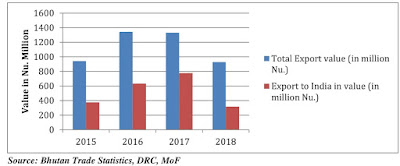Cardamom Export to India
Cardamom is one of the main cash crops for the people living in the Southern and Central regions of Bhutan. It is the main source of livelihood for most of the rural farmers living in these regions. The major cardamom growing districts are Chukha, Dagana, Samdrupjongkhar, Samtse, Sarpang and Tsirang. Cardamom is mainly exported to the neighboring markets in India and Bangladesh.
It is one of the top ten export commodities of the country and contributes significantly to our overall export earnings.
However, in 2018 there was a decline in the export to India by 25%.
The decline in the export of cardamom to India in 2018 was on account of the introduction of the Goods and Services Tax (GST) regime in India. Starting from July 1, 2017, the Government of
India (GoI) introduced the Indian Customs Electronic Commerce (ICEGATE)/Electronic Data Interchange (EDI) system in most of the Land Customs Stations (LCS) across India. The new system at the entry/exit points between Bhutan and India required a separate notification to allow import of plant and plant products from Bhutan to India, through designated routes making it difficult to export
the produce to India despite having a good harvest/yield.
In view of the difficulties faced by our exporters, the government decided to intervene in order to prioritize resolving the issue at the earliest. In order to address the problem, the Department of Trade, Ministry of Economic Affairs requested GoI through the Ministry of Foreign Affairs to notify the designated points of entry for import of Plants/Plant Materials into India and also to recognize the
Phytosanitary (PS) certificates issued by the Bhutan Agriculture and Food Regulatory Authority (BAFRA) for export of agricultural products.
Accordingly, GoI considered RGoB’s request and four land frontier stations namely, Jaigoan (West Bengal), Chamurchi (West Bengal), Daranga (Assam) and Hathisar (Dadgiri, Assam) were notified on December 18, 2018 to facilitate export of plants/plants materials to India. Further, GoI also accorded due recognition to the PS certificates issued by BAFRA at the LCS in India for export
of agricultural products from Bhutan.
With the prompt assistance and cooperation of the GoI, the long-standing problem to export cardamom from Bhutan has been resolved successfully. The simplification of the customs working procedures at the LCS and mutual recognition of PS certificates
has enabled our exporters to export Bhutanese cardamom to India. Such timely intervention was a huge relief to our farmers and the export of cardamom to India in the coming years is expected to increase significantly.
Note: Contributed this article for our Ministry's first Biannual Newsletter published in June, 2019.
It is one of the top ten export commodities of the country and contributes significantly to our overall export earnings.
The figure below shows the total export of cardamom and export to India from 2015-2018.
In 2015, Bhutan exported a total of 846 MT of cardamom valued at Nu. 941 million, of which 314 MT valued at Nu. 376 million was exported to India.
The export to India increased by 7% in 2016. Similarly, in 2017 out of the total export of Nu. 1,330 million, 59% of the produce was exported to India.
However, in 2018 there was a decline in the export to India by 25%.
The decline in the export of cardamom to India in 2018 was on account of the introduction of the Goods and Services Tax (GST) regime in India. Starting from July 1, 2017, the Government of
India (GoI) introduced the Indian Customs Electronic Commerce (ICEGATE)/Electronic Data Interchange (EDI) system in most of the Land Customs Stations (LCS) across India. The new system at the entry/exit points between Bhutan and India required a separate notification to allow import of plant and plant products from Bhutan to India, through designated routes making it difficult to export
the produce to India despite having a good harvest/yield.
In view of the difficulties faced by our exporters, the government decided to intervene in order to prioritize resolving the issue at the earliest. In order to address the problem, the Department of Trade, Ministry of Economic Affairs requested GoI through the Ministry of Foreign Affairs to notify the designated points of entry for import of Plants/Plant Materials into India and also to recognize the
Phytosanitary (PS) certificates issued by the Bhutan Agriculture and Food Regulatory Authority (BAFRA) for export of agricultural products.
Accordingly, GoI considered RGoB’s request and four land frontier stations namely, Jaigoan (West Bengal), Chamurchi (West Bengal), Daranga (Assam) and Hathisar (Dadgiri, Assam) were notified on December 18, 2018 to facilitate export of plants/plants materials to India. Further, GoI also accorded due recognition to the PS certificates issued by BAFRA at the LCS in India for export
of agricultural products from Bhutan.
With the prompt assistance and cooperation of the GoI, the long-standing problem to export cardamom from Bhutan has been resolved successfully. The simplification of the customs working procedures at the LCS and mutual recognition of PS certificates
has enabled our exporters to export Bhutanese cardamom to India. Such timely intervention was a huge relief to our farmers and the export of cardamom to India in the coming years is expected to increase significantly.
Note: Contributed this article for our Ministry's first Biannual Newsletter published in June, 2019.


